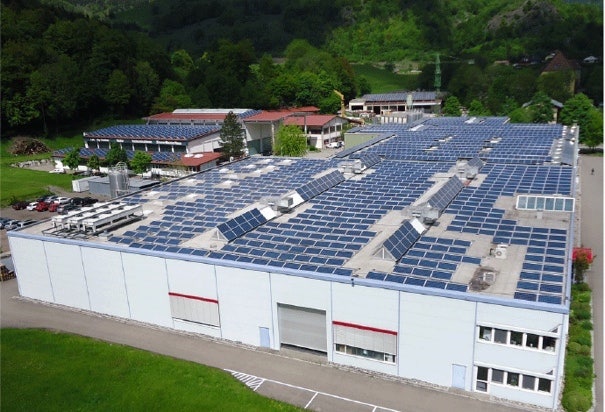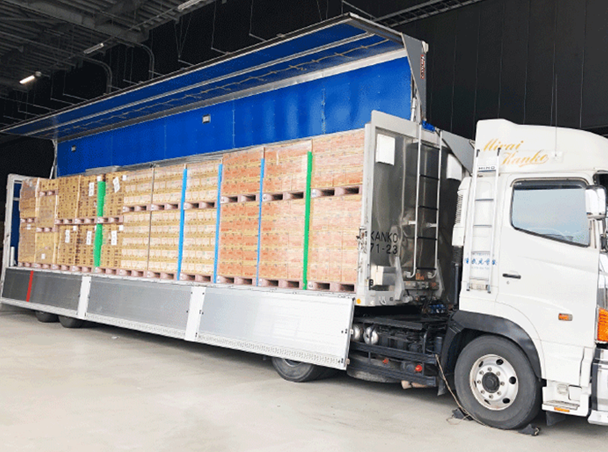Climate Action
Regarding climate action, the most critical environmental challenge, we present our activities concerning CO₂ emission reduction targets, expanding use of renewable electricity, and efficient energy consumption.
Approach and Background
Environmental destruction and the negative economic impacts of abnormal weather and natural disasters caused by global warming are becoming ever more serious. Within the activities of corporations, the need to reduce CO₂ emissions is urgent.
We are taking action to meet the challenges of climate change in a variety of ways, such as by using renewable electricity at plants, the installation of solar panels, the use of LED lighting, the improvement of energy use efficiency in production facilities, and the electrification of company-owned vehicles.
Mid- to Long-Term Environmental Targets and Results

* Scope of data:Data from group-owned global plants is integrated. Electricity, water and CO₂ are counted for the US Oral care plant, and electricity and CO₂ are counted for Tsubamex
Consumer Business = Oral care products, cosmetics, health foods, and other consumer product-related businesses
Industrial Business = Adhesives and sealants for automobiles, construction and electronics, and metal parts for motorcycles and automobiles, excludes TOYOPOLYMER CO., LTD.
* Evaluation criteria: ◎ = Exceeds targets, ○ = Mostly on target, △ = Missed target but making progress, × = Worse than before
*8 Including US oral care plants and our offices in Japan, Americas and Europe
*9 Base year: 2020 for the Consumer Business, 2019 for the Industrial Business (because 2020 was a year of significant production cuts for the client companies)
“Environmental Data” for details
Expanding the scope of CO₂ emissions calculations
Beginning Scope 3 emissions calculation and disclosure (Japan)
Sunstar previously calculated and disclosed group global emissions volumes in the range of Scope 1 + 2, which cover emissions emitted within the company. Now we are progressively adding Scope 3 calculations emitting from external business activities. The following graph shows the Scope 1 + 2 + 3 CO₂ emissions volumes and ratio for the Japan area in 2023. Sunstar has begun to ascertain its CO₂ emissions volumes across its entire supply chain and is discussing measures to reduce this. We have begun requesting the provision of category one (raw material production) primary data, which makes up a large portion of Scope 3 emissions. By refining our data and working to reduce CO₂ emissions at our partners, we have managed to reduce our 2023 emissions by over 6,000 tons compared to calculations using average emission factors.
< Japan Area Total >

< Consumer Business* in Japan >

< Industrial Business* in Japan >

* Consumer Business = Oral care products, cosmetics, health foods, and other consumer products businesses
* Industrial Business = Adhesives and sealants for automobiles, construction and electronics, metal parts for motorcycles and automobiles and other industrial products businesses (excluding Tsubamex)
Major Initiatives
Cutting CO₂ emissions by efficient energy management and local sourcing of raw materials
At our German toothbrush and interdental brush factory, we’re driving down CO₂ emissions through smarter energy use and sustainable sourcing.
A waste heat recovery system now heats the facility, saving up to 50,000 liters of heating oil annually—equal to the power use of 140 households. Additional measures, like insulating molding machines and switching 99% of lighting to LEDs, further reduce energy consumption.
With 670 kWp of solar panels, river water cooling, and over 80% of raw materials sourced within 500 km, the plant continues to cut emissions while supporting regional suppliers.

Expanding use of renewable electricity (Global)
In Europe, our global headquarters in Switzerland runs entirely on renewable electricity, while our German toothbrush and interdental brush plant covers 15% of its electricity needs with rooftop solar power and sources the remaining electricity entirely from hydroelectric energy. The mouthwash plant in Yamanashi, Japan, equipped with rooftop solar panels and 100% LED lighting, generates 9% of electricity generated in-house. At the adhesive plant in Germany and the adhesive and metal parts plants in Singapore, solar panels were installed in 2023, supplying 30 to 50 % of the electricity used at each facility. We will continue to expand in-house power generation using renewable energy.
Furthermore, regarding electricity procured from electric companies, we are rapidly expanding the switch to renewable electricity in the Americas, Japan and Asia from 2024 to 2025, aiming to achieve our 2025 target.

Expanding use of renewable electricity (Americas)
We began purchasing Renewable Energy Certificates (RECs) starting in 2025 for our offices, factories, and development centers in Schaumburg, near Chicago, USA. The annual renewable electricity usage rate at our U.S. facilities will be 65%. This milestone reflects our ongoing commitment to reducing carbon emissions and transitioning to cleaner energy sources.

CO₂ emission reduction by joint logistics with other industries (Japan)
We are working on joint logistics with different industries to improve efficiency and reduce environmental impact during product delivery. One such effort is promoting collaboration among companies to reduce the number of trucks used and subsequent CO₂ emissions by increasing the loading efficiency.

Reduced CO₂ emissions through renewal and efficient operation of plant facilities (Japan)
At the Tokushima Plant, which manufactures toothbrushes and interdental brushes, we reduced electricity consumption by 300,000 kWh in 2021 compared to the previous year, and we have reduced CO₂ emissions by 60 tons through to 2022. This was achieved by switching to LED lighting, replacing plant equipment and air-conditioning equipment with energy-efficient units, and using air flowmeters to detect leaks and improve operations of production equipment.
At the Takatsuki Plant, we proceeded with switching to LED lighting and electrification of forklifts.


Natural River Cooling Reduces Energy Demand (Europe)
In our European plant in Germany, we use cool water from a nearby river to regulate the temperature of our machines and molds. This system is carefully managed, with strict controls on water temperature and volume to ensure environmental protection.

Supporting customers with Manufacture 2030 Platform (Americas)
At Sunstar, we are committed to helping our customers achieve their sustainability goals. Through the Manufacture 2030 Platform, we collaborate on Scope 3 CO₂ reduction, provide eco-conscious solutions, and share ESG data and best practices.
